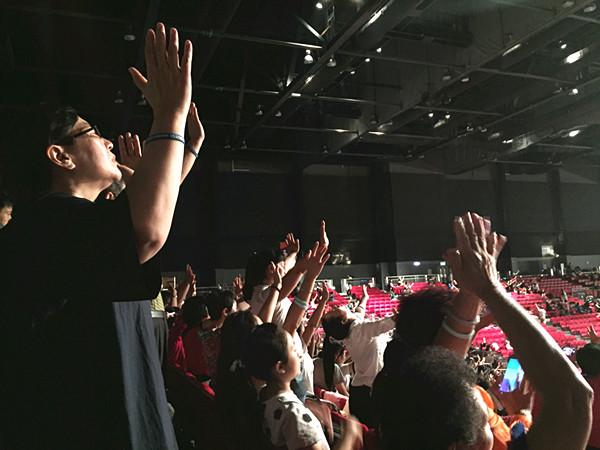Taiwan's aboriginal people have experienced economic competition and military conflict, even turned as a guest from being the host of this island since a major Han immigration began in the 17th century that overran the island's population. There are still unhealed wounds in their hearts as the history of the island showed that the Taiwanese aborigines were oppressed and ill-treated by Han and that sentment remained.
"Chinese Homecoming 2016" pays a great attention to the reconciliation between Han Chinese and Taiwanese aborigines.
"This (the unity of Greater China) has been accomplished because the work of the Lord Jesus on the cross completed it. But we must not stop here, and listen to their (Taiwanese aborigines) stories, touch their hearts and feel what they experienced to let the Holy Spirit open everyone's heart." said Rev. Ma Jianming on the morning of July 14, the first day of the gathering.
He invites several aborigines to go up unto the platform, appealing for Greater China to be united.
Rev. Enoch, a Taiwanese aborigine, shared that God knows that their history is made of sufferings as their songs were composed by tears. Thus, He sent a group of Han people to visit the indigenous Taiwanese and God healed them when the team knelt on the ground before the people with tears dropping on the land while listening to their stories.
Following this, a pastor who led the visit tells the audience the whole story. He says the visit originated from "Chinese Homecoming 2013" when God spoke through an Egyptian prophet to require the Chinese to present genuine repentance to Taiwanese aborigines in the next assembly.
Led by the Lord in prayer, he began the visit from the confession of an Atayal pastor, as well as his friend. But he had no idea on how to say any word to apologize before his friend, while the Lord asked them to surrender their ears and hearts to listen.
The next day, he suddenly burst into tears when the pastor told them his story.
"We never thought of the impact of their said issues had on their lives," he says with sobs when recalling the past experience, "We always consider ed'what our relationship is' or 'what we felt sorry to them' but don't feel what they think and feel."
They prayed with tears on their knees, repenting for the grudges of the last generation and their ignorance, pride, evil, and blindness without understanding God's will for the native people.
The friend accepted their apology, blessed them, and led them to the next tribe. They also visited other ethnic groups, including the Truku, Amis, Bunun, Seedip, Saisiyat, Thao, Tsou, and Tao.
His speech moved several mainland Han Christians to tears and he apologized for and repented for the past evil on the natives, asking God to heal them to be united in Christ's love.
Finally, an aboriginal representative who experienced the apology of the pastoral team said that his heart started to melt while telling the previous experiences of such instances and came to know that the heavenly father who cared about their past and the group finding them. He added that he felt joyous and identified them as his family when seeing their Han friends.
- Translated by Karen Luo












